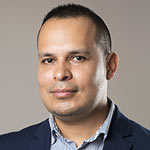Economics and Business: Welfare and Internationalization (UNED and Nebrija)

The Interuniversity Doctoral Program in Economics and Business: Welfare and Internationalization is a joint program of the Antonio de Nebrija University and the Spanish Open University (UNED)
The program brings together a teaching staff of 22 researchers with a marked international profile around two areas:
- 1) Welfare, education, work and public policies.
- 2) Internationalization of Companies and global markets.
Objectives
The objectives of the program, and its commitments to doctoral students, are:
- Contribute to the training of doctors and researchers, with the aim that they can practice their professional life in the field of academia, research centers, the Administration and companies with a social impact.
- Provide the program's doctors with the necessary knowledge and competences so that they can carry out their future research activity autonomously and competitively, by publishing in international journals with an impact factor, participating in international networks, and carrying out national and international projects.
- Generate scientific findings and knowledge in the areas of microeconometrics, inequality, the labor market, the internationalization of companies, education and welfare.
- Establish a center for generating knowledge and talent, which can transfer results, proposals and policies to society, aimed at improving citizens' welfare.
- Promote cooperation between universities and the mobility of students and teaching staff.
- Develop a complete and complex academic curriculum model that is committed to the multidisciplinary nature of training in Economics and Business within the University.
- Full adaptation of the level of university studies in Economics and Business in our country to that existing within the European Union and other neighboring countries, culminating the process that began with integration into the university system in 1996.
- Development of specialization profiles in areas that make it possible to take into account the innovation needs required by the Economy and Business field.
Access to the Doctorate Programme
Organization
Professors
 Santiago Budría Rodríguez
Catedrático/Director - Universidad Nebrija
Santiago Budría Rodríguez
Catedrático/Director - Universidad Nebrija
 Raúl Mínguez Fuentes
Titular B - Universidad Nebrija
Raúl Mínguez Fuentes
Titular B - Universidad Nebrija
 Juan Carlos Campaña Naranjo
Agregado - Universidad Nebrija
Juan Carlos Campaña Naranjo
Agregado - Universidad Nebrija
 Miren A. Alzua Sorzabal
Catedrático/Director - Universidad Nebrija
Miren A. Alzua Sorzabal
Catedrático/Director - Universidad Nebrija
 Paola Rodas Paredes
Agregado - Universidad Nebrija
Paola Rodas Paredes
Agregado - Universidad Nebrija
 José Luis García Delgado
Catedrático/Director -Jubilado- Universidad Nebrija
José Luis García Delgado
Catedrático/Director -Jubilado- Universidad Nebrija Miembro de la Real Academia de Ciencias Morales y Políticas de España
Employability
Career Opportunities
In recent years, the experience of doctoral students with a profile in applied economics shows that most graduates of these programs diversify their careers between continuing in academia and working in different areas of public administration. In the first place, a large number of these graduates that consider some of the proposals of our program are currently employed as professors and researchers in different research centers and universities in Spain and abroad.
Second, a large number of graduates of doctoral programs in public policy evaluation methods are working in different areas of public administration (Ministries, AIREF, etc.) and national and international, public and private organizations (World Bank, European Union, Central Banks in different countries, etc.), mainly in research, but also in management roles.
The Interuniversity Doctoral Program in Economics and Business: Welfare and Internationalization provides its students with a solid background in economic and social research, in areas of great relevance, such as labor markets, education, welfare, the economic environment, internationalization of companies and the evaluation of risks and policies. The program's doctoral students will benefit from skills that will allow them to combine theory with data analysis, in order to extract relevant decisions from the point of view of public policy or private strategy. Studying in this program, therefore, is the first step of an academic career or a professional life in government departments, international organizations and statistical institutions. Some examples of careers in international organizations that request specialties related to our program can be found at www.oecd.org/careers/, iadbcareers.referrals.selectminds.com/latest-jobs and worldbankgroup.csod.com/ats/careersite/.
Agreements
Activities in Economics and Business: Welfare and Internationalization (UNED and Nebrija)
Visit all the Activities of the School of Economics and Business


